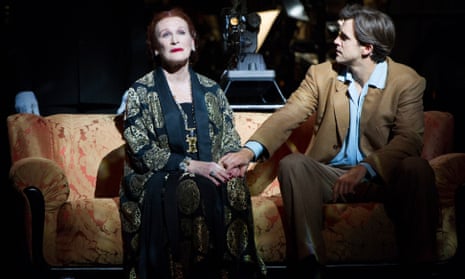Billy Wilder, on emerging from the original 1993 staging of Andrew Lloyd Webber’s Sunset Boulevard, quipped: “It’ll make a good movie.”
The joke is that it was already a Hollywood classic that no musical could ever quite match. But this semi-staged version seems closer to the Wilder film noir and boasts a breathtaking performance from Glenn Close as the fallen Hollywood star, Norma Desmond, lost in a world of illusions.
This is, in fact, the second musical to be staged during a gap in the English National Opera season as a means of enhancing their revenues – and the relief is that it works.
For a start, it has none of the epic scale of the original London production. Norma Desmond’s baroque palazzo, where she lives as a recluse, is evoked through nothing more than intertwined gantries lit from within.
Joe Gillis (Michael Xavier), the young scriptwriter who becomes ensnared in her fantasy world, simply signals to the on-stage conductor when the scene needs to abruptly change.
Car journeys along the eponymous boulevard are suggested through actors clutching hand-held lights. The consequence is that the book and lyrics by Don Black and Christopher Hampton, which remain commendably faithful to the movie, make their mark – and the story, which is basically about the entrapment of a weak-willed writer in an ageing star’s dreams, retains its darkness.
But the chief pleasure of Lonny Price’s production lies in watching Close, who has already played Norma in Los Angeles and New York.
Her big achievement is to treat the character not as a grotesque harpy but as a real woman who lives in a remembered past. You believe her when, in one of Lloyd Webber’s best numbers, she hymns the days of the silent movies and sings: “When I look your way / You’ll hear what I say.”
Close also delivers the big lines not with a camp flourish but as if they were sincerely felt. When she rejects the word “comeback” and tells Joe she plans a “return”, you feel this is something that springs from deep conviction. The other key to Close’s performance is that she seems to grow younger with each scene, as she takes the pliant Joe as her lover.
At first, Close is imperious and aloof in gold and black. But, melted by Joe’s attention and the belief that Cecil B DeMille plans to film her dreadful script of Salome, Close becomes almost skittish. The great moment in her performance comes when she returns to Paramount, sits in a studio chair and basks in the spotlight as if reliving her past triumphs.
The temptation is to see Norma as a sacred monster or a movie Miss Havisham: in Close’s hands she becomes a victim of her own delusions. Xavier makes Joe a plausibly drifting opportunist, Siobhan Dillon is good as the burgeoning writer he falls for, even if their love duet is one of the weaker numbers. Fred Johanson is full of stately grandeur as the manservant Max who is one of Norma’s few allies.
It is also a pleasure to hear the Lloyd Webber score, with its echoes of Hollywood’s own Franz Waxman, played by the 48-strong onstage orchestra under the baton of Michael Reed: it’s the most sumptuous sound I’ve heard in a musical since the Hallé orchestra accompanied Bernstein’s Wonderful Town.
It may not be a perfect musical, but a show that in 1993 seemed too big and spectacular to catch the ironic tone of the Wilder movie has been given a new lease of life. Sometimes semi-staged is better than the luxurious grandeur of an elephantine West End musical.
- At the Coliseum, London, until 7 May. Buy tickets at theguardianboxoffice.com

Comments (…)
Sign in or create your Guardian account to join the discussion